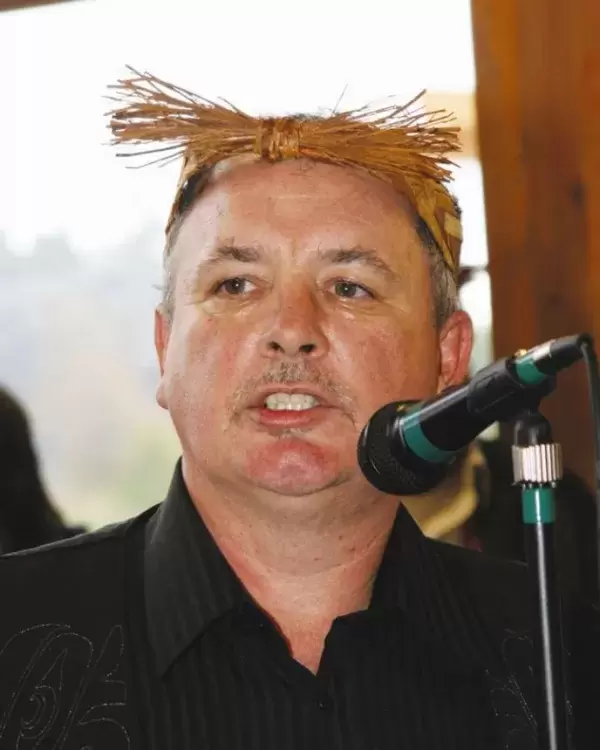Chief Councillor Les Sam seems very optimistic for his community as 2011 begins. There are many doors opening that will benefit Tseshaht members, he said.
His conversation with Ha-Shilth-Sa on Jan. 6 was wide ranging, with fishing, economic development and housing just some of the topics touched upon.
Though there was no official prediction of the state of the sockeye stock this year, Sam has been hearing that the run in 2011 will be a healthy one, he said.
And the plan is to continue to fish to Tseshaht’s management plan, just as the community did last year when the return of sockeye was much, much better than initially forecast.
The department of Fisheries and Oceans was at loggerheads with Tseshaht members and their road side fish sales last year, despite the high numbers of sockeye that were available to be harvested. DFO promised to return to the negotiation table after the harvest to discuss catch for 2011. And they kept that promise. Tseshaht was preparing to meet that very afternoon, shortly after our interview with Sam, with fisheries representatives for the first time since last year’s harvest.
Despite failing to come to any agreement in recent years over allowable catch, Tseshaht continues to meet with DFO. Sam said the community never walks away from the talks.
On another fisheries front, Sam predicted a win for Nuu-chah-nulth when the court comes back with a decision on Canada’s appeal of the Nuu-chah-nulth fishing rights win. You will remember that BC Supreme Court Judge Nicole Garson found on Nov. 3, 2009 that Nuu-chah-nulth nations have a right to fish and sell fish—all species—in the commercial market place. The court heard the appeal of her decision on Dec. 6 to 10, 2010.
While part of the initial group of Nuu-chah-nulth nations that initiated the fish litigation, Tseshaht was among those nations forced into a second phase of the case due to unresolved boundary issues.
Sam says Tseshaht is working with neighboring Hupacasath to sort out the issue of title of the Somass River and the fish that flow through it. A legal opinion on phase two of the case has now been received from Tseshaht’s legal team, and leadership has a plan to move forward once it meets the challenge of the court to resolve the waterway issue.
Other boundary issues remain unresolved for Tseshaht as the five nations of the Maa-nulth Final Agreement prepare for effective date on April 1. Sam says he’s hoping to stand up in celebration of the treaty with the Uchucklesaht, Huu-ay-aht, Ucluelet, Toquaht and Ka:’yu:’k’t’h’/ Che:k:tles7et’h’, but boundary issues are unresolved.
There is land that has been included in the settlement of Maa-nulth that Tseshaht claims is in its core territory. Sam said he hoped that the issue could be resolved so that Tseshaht wouldn’t have to interfere in the implementation of the Maa-nulth treaty.
Frustrating negotiations, however, is Gordon Campbell’s resignation as premier of the province, with the resulting leadership race of the governing Liberal party.
There is also some upheaval in the court-ordered mediation of the lands removed from Tree Farm Licence 44. The provincial negotiators’ mandate seems to have disappeared, said Sam.
“There’s a lot of uncertainty in the decision-making process.”
In regards to forestry, Tseshaht has tidied up their holdings by consolidating them under one company, Tseshaht Forestry Corp. Forestry markets have rebounded, and timber products are beginning to move again.
Tseshaht has also developed a forestry engineering arm designed to provide for the needs in infrastructure development—roads, bridges, etc.—and quantitative analysis, block selection, as well as other functions.
On the economic front, Tseshaht Market continues to do well, and a market working group is preparing to expand the business. An RV site adjacent to the market is also being evaluated.
Sam said Tseshaht’s goal is to explore every economic opportunity that lands at its doorstep. Tseshaht is looking into generating hydro, a greenhouse operation and exploring the creation of retail space with Hupacasath at the Clutesi Haven Marina site.
Tseshaht has hired a fisheries biologist to expand its harvest of marine resources. Tseshaht already carries a number of licenses, but there are greater opportunities that the community has left untapped. Sam said Tseshaht has one of the most productive clam beaches in its territory, but it has not been seen, until now, as economically viable. Combine the harvest of clams with the harvest of a few other marine resources, and all of a sudden, there is money to be made.
It’s all about creative thinking, Sam said.
Tseshaht continues its building efforts to house community members. There is still 80 names on the waiting list for homes, and Tseshaht continues to look for funding to develop a 60-lot subdivision. There are 14 units currently under construction, with eight of those framed in. On his wish list is the development of 20 homes in the coming year. He hopes it will be possible.
There are other initiatives that will propel the community forward in 2011. He hopes for more graduated from the SEEDS program, which helps the unemployed to become job ready. He’s looking forward to assisting Tseshaht elders to attend the Elders Gathering hosted this summer in Chilliwack. He expects the conference will be a great event that the elders will get a lot out of.
Sam wants to continue with efforts to develop protocol agreements with local governments and big business. In December 2010, Tseshaht and the City of Port Alberni signed a protocol that established how they would work together going forward.
And he’s hoping to build on the nation to nation ties that have been established between Nuu-chah-nulth nations in regard to economic development, including fisheries.
“It’s really important for people to work together,” said Sam, especially when it comes to advancing the First Nations’ agenda.
He said Tseshaht’s doors are always open if other nations need their expertise or support.
“We know we can depend on one another.”







